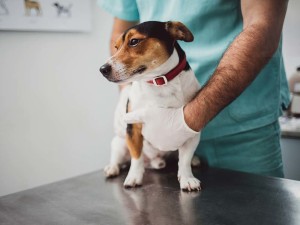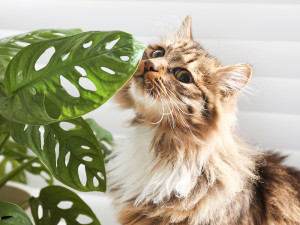How to Deal with Cat Diarrhea
Dr. Audrey K. Cook’s tips to getting to the bottom of a sh*tty situation.

Share Article
Your cat’s litter box is unusually smelly, and when you go to scoop it, you find a liquid mess. Oh, no. Gross. It’s nobody’s favorite veterinary problem, but diarrhea is something that most cat parents will face at least once, which is why I spoke with Dr. Audrey K. Cook, professor of Small Animal Internal Medicine at Texas A&M College of Veterinary Medicine, to learn about this common malady.
First of all, diarrhea or any change in stool consistency is a non-specific clinical symptom, not a disease in and of itself. It could indicate many problems going on with your cat’s gut, or even with their emotions. When your cat’s stool gets loose and watery, there are many things that may have triggered it. “Diarrhea simply tells us that the gastrointestinal (GI) tract isn’t working like it is supposed to,” says Dr. Cook. “This is often due to a disease specifically related to the GI tract but can also be a sign that something else is wrong, such as the pancreas or thyroid gland. Anxiety and stress can even cause diarrhea.”
How loose does a stool need to be in order to be considered diarrhea? A normal stool is pretty firm, and you can pick it up easily with a baggie or scooper. “A stool that can be squished by the fingers or leaves a streak on the scooper is abnormal,” Dr. Cook says. Now that we’ve got the clinical stuff out of the way, let’s get started learning about its causes, effects, and everything in between.
Causes of Diarrhea in Cats
Did you just change your cat’s diet without a transition period (mixing the old with the new food over the course of a few days)? If you feed your cat the same kibble or canned food every day, then suddenly switch to a new brand, your cat’s system may become irritated, and diarrhea is a possible result. Likewise, Dr. Cook explains, your cat might eat something that doesn’t settle well, which is called dietary indiscretion, which is a very common cause of diarrhea.

Diarrhea also has more infectious causes, which predominantly affect younger cats and those in shelters. If there is an infectious cause of diarrhea, like parasites, it can spread rapidly among a group of kittens. Parasites like roundworms and coccidia are easy to diagnose and treat, unlike serious contagious diseases, like Feline Infectious Peritonitis, which often prove more difficult.
Less common causes of diarrhea include a complex condition called chronic enteropathy, where the GI tract gets inflamed, but vets can’t find a cause, Dr. Cook says. If your kitty has this condition, your veterinarian might recommend a diet with limited antigens or hydrolyzed proteins. Antibiotics or steroids also might help. If you have a senior cat with diarrhea, it could be a symptom of small cell lymphoma, which is a diffuse low-grade cancer of the bowel. But don’t worry: A simple cause, like a dietary trigger, is the most likely one in cases of feline diarrhea.
How to Treat Cat Diarrhea
First of all, if you have a multi-cat household, you may not know which kitty has the runs and has made the mess in the litter box. Besides observing the litter box traffic, you might need to keep your cats in separate rooms until you identify which cat has diarrhea. But if one of your cats is losing weight or is showing a reduced appetite, they’re likely the one with the problem.
When is it time to see your veterinarian? No need to rush to a clinic in many cases, Dr. Cook explains. So long as your cat is eating normally and otherwise well, she recommends waiting two to three days before seeing your vet; the diarrhea is probably a transient digestive upset. However, if your cat seems ill in addition to the diarrhea, especially if your cat isn’t eating or is an adolescent, seek prompt veterinary care, Dr. Cook recommends.
Forget finding a cheap, simple remedy at a pet store or drugstore, she says. “There really aren’t any useful OTC options, and some of the things that people take for diarrhea are actually harmful to cats,” Dr. Cook says. It is important to note: Even if you are spared the unpleasant experience of diarrhea, your cat can still have a serious GI tract disease with signs from the other end. The most common symptoms would be vomiting, a loss of appetite, and weight loss.
How to Prevent Cat Diarrhea
Can we prevent our kitties from getting diarrhea, and spare both human and animal the misery? In many cases, yes. If you have a kitten, make sure you get routine deworming treatments, and any additional long-term preventatives your vet recommends. Select a high-quality diet that is high in protein for your cat, and feed this food consistently, she says. Finally, please don’t let your cat outside. According to Dr. Cook, “Keeping your cat indoors reduces the risk of it picking up an infection or eating something foolish.”

Kellie Gormly
Kellie B. Gormly is an award-winning journalist based in Pennsylvania who writes for many national publications, including The Washington Post, Woman's World, Catster, and Dogster. Kellie is a volunteer rescuer who fosters kittens and cats at her home, where she has several of her own cats and betta fish.
Related articles
![Veterinarian examining a dog]()
My Dog Has Diarrhea. Should I Call the Vet?
Certain symptoms could mean your dog is battling a potentially fatal condition called hemorrhagic gastroenteritis (HGE). Here’s everything you need to know.
![cat sniffing a plant]()
Household Plants That Are Toxic to Cats
These plants might be beautiful, but they’re deadly to feline foragers.


